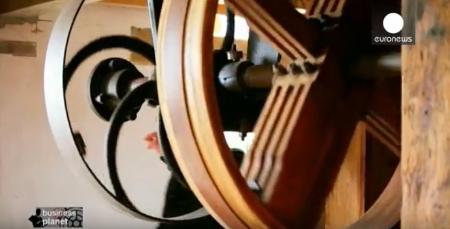Power to the people with renewable energy cooperation (Business Planet - euronews)
julio 2014

La vidéo : 3min14
In this edition of Business Planet we see how the European Network of Renewable Energy Source Cooperatives -- known as REScoop -- is making it easier to meet the EU’s target of 20 percent of the region’s energy being from renewables by 2020.
Reporter Serge Rombi is in Belgium to check out a whole new generation of cooperatives, intended to speed up the process of energy transition.
EcoPower is a Belgian cooperative using wind power, bio-gas and solar energy. It is also one of the founders of REScoop, the European Network of Renewable Energy Source Cooperatives.
EcoPower’s electricity -- which is sold at cost price -- accounts for 1.5 percent of the market in the Flanders region. Set up in 1991, the cooperative now employs 25 people full time.
Dirk Vansintjan is a member of Ecopower’s board and REScoop’s president. He told euronews: « EcoPower started small, around a kitchen table, with a few people. But, now we represent 50,000 members. We have equity of 50 million euros and [annual] turnover of more than 25 million euros. »
The European Network of Renewable Energy Source Cooperatives now has 3,000 members working together, particularly focused on finding funding.
Dirk Vansintjan explained the advantages of that: « One wind turbine costs three million euros. You can easily see this cost is a problem for a small group. That is why bigger energy cooperatives help out those that are just starting out by offering them a bank guarantee or loans. »
The emergence of such organisations, using new business models, is a good demonstration of how the so-called social economy works.
Cooperatives that produce and supply renewable energy focus on mutual aid and solidarity, but also make sure that contracts are awarded fairly.
Their profits are reinvested, or redistributed in the form of dividends or as discounts or rebates.
Benjamin Huybrechts, a social economy expert at the HEC Management School, University of Liege, says that influences vital decisions: « For example, if a farmer offers his fields for a wind turbine company, a neighbouring farmer can’t do the same because turbines are not allowed to be too close together. So only the first farmer would receive money. Whereas in a cooperative system, a decision can be taken collectively, and profits reinvested in the community, so everybody living there benefits. »
